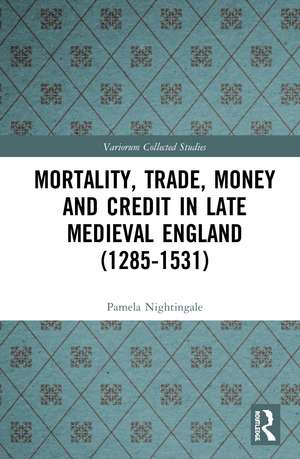Mortality, Trade, Money and Credit in Late Medieval England (1285-1531): Variorum Collected Studies
Autor Pamela Nightingaleen Limba Engleză Hardback – 22 iul 2020
| Toate formatele și edițiile | Preț | Express |
|---|---|---|
| Paperback (1) | 259.98 lei 6-8 săpt. | |
| Taylor & Francis – 29 apr 2022 | 259.98 lei 6-8 săpt. | |
| Hardback (1) | 1114.40 lei 6-8 săpt. | |
| Taylor & Francis – 22 iul 2020 | 1114.40 lei 6-8 săpt. |
Din seria Variorum Collected Studies
- 9%
 Preț: 938.85 lei
Preț: 938.85 lei -
 Preț: 311.41 lei
Preț: 311.41 lei -
 Preț: 351.48 lei
Preț: 351.48 lei -
 Preț: 313.38 lei
Preț: 313.38 lei -
 Preț: 386.77 lei
Preț: 386.77 lei -
 Preț: 325.68 lei
Preț: 325.68 lei -
 Preț: 396.00 lei
Preț: 396.00 lei -
 Preț: 312.75 lei
Preț: 312.75 lei - 9%
 Preț: 1041.23 lei
Preț: 1041.23 lei -
 Preț: 258.66 lei
Preț: 258.66 lei -
 Preț: 299.55 lei
Preț: 299.55 lei - 9%
 Preț: 938.08 lei
Preț: 938.08 lei -
 Preț: 343.33 lei
Preț: 343.33 lei -
 Preț: 311.18 lei
Preț: 311.18 lei - 9%
 Preț: 937.13 lei
Preț: 937.13 lei -
 Preț: 341.55 lei
Preț: 341.55 lei -
 Preț: 320.00 lei
Preț: 320.00 lei - 34%
 Preț: 764.20 lei
Preț: 764.20 lei - 22%
 Preț: 312.43 lei
Preț: 312.43 lei - 34%
 Preț: 739.65 lei
Preț: 739.65 lei - 34%
 Preț: 764.20 lei
Preț: 764.20 lei - 34%
 Preț: 680.73 lei
Preț: 680.73 lei - 26%
 Preț: 247.40 lei
Preț: 247.40 lei - 34%
 Preț: 485.78 lei
Preț: 485.78 lei - 34%
 Preț: 764.20 lei
Preț: 764.20 lei - 34%
 Preț: 767.07 lei
Preț: 767.07 lei - 34%
 Preț: 764.20 lei
Preț: 764.20 lei - 34%
 Preț: 769.51 lei
Preț: 769.51 lei - 34%
 Preț: 764.20 lei
Preț: 764.20 lei - 34%
 Preț: 826.68 lei
Preț: 826.68 lei - 25%
 Preț: 225.28 lei
Preț: 225.28 lei - 25%
 Preț: 225.54 lei
Preț: 225.54 lei - 34%
 Preț: 736.38 lei
Preț: 736.38 lei - 34%
 Preț: 738.43 lei
Preț: 738.43 lei - 25%
 Preț: 226.52 lei
Preț: 226.52 lei - 33%
 Preț: 491.66 lei
Preț: 491.66 lei - 34%
 Preț: 485.78 lei
Preț: 485.78 lei - 34%
 Preț: 485.78 lei
Preț: 485.78 lei - 36%
 Preț: 739.17 lei
Preț: 739.17 lei - 38%
 Preț: 766.34 lei
Preț: 766.34 lei - 31%
 Preț: 473.94 lei
Preț: 473.94 lei - 18%
 Preț: 807.71 lei
Preț: 807.71 lei - 38%
 Preț: 774.91 lei
Preț: 774.91 lei - 34%
 Preț: 764.20 lei
Preț: 764.20 lei - 34%
 Preț: 764.20 lei
Preț: 764.20 lei - 51%
 Preț: 485.78 lei
Preț: 485.78 lei - 34%
 Preț: 485.78 lei
Preț: 485.78 lei - 34%
 Preț: 769.10 lei
Preț: 769.10 lei - 34%
 Preț: 766.65 lei
Preț: 766.65 lei - 18%
 Preț: 1019.01 lei
Preț: 1019.01 lei
Preț: 1114.40 lei
Preț vechi: 1359.02 lei
-18% Nou
Puncte Express: 1672
Preț estimativ în valută:
213.25€ • 223.66$ • 177.52£
213.25€ • 223.66$ • 177.52£
Carte tipărită la comandă
Livrare economică 01-15 aprilie
Preluare comenzi: 021 569.72.76
Specificații
ISBN-13: 9780367260194
ISBN-10: 0367260190
Pagini: 302
Ilustrații: 6
Dimensiuni: 156 x 234 x 18 mm
Greutate: 0.6 kg
Ediția:1
Editura: Taylor & Francis
Colecția Routledge
Seria Variorum Collected Studies
Locul publicării:Oxford, United Kingdom
ISBN-10: 0367260190
Pagini: 302
Ilustrații: 6
Dimensiuni: 156 x 234 x 18 mm
Greutate: 0.6 kg
Ediția:1
Editura: Taylor & Francis
Colecția Routledge
Seria Variorum Collected Studies
Locul publicării:Oxford, United Kingdom
Cuprins
1 Some new evidence of crises and trends of mortality in late medieval England; 2 Alien finance and the development of the medieval English economy, 1285–1511; 3 The impact of crises on credit in the late medieval English economy; 4 English medieval weight standards revisited; 5 Finance on the frontier: money and credit in Northumberland, Westmorland and Cumberland, in the later middle ages; 6 The intervention of the crown and the effectiveness of the sheriff in the execution of judicial writs, c. 1355–1530; 7 The rise and decline of medieval York: a reassessment; 8 The rise of London as a financial capital in late medieval England; 9 Gold, credit, and mortality: distinguishing deflationary pressures on the late medieval English economy; 10 Credit and the effect of the Black Death on regional commercial economies, 1350–1369; 11 A crisis of credit in the fifteenth century, or of historical interpretation?
Notă biografică
Pamela Nightingale was a scholar of Newnham College, Cambridge, where, for her Ph.D., she worked on the history of the East India Company in the eighteenth century. Her thesis was published in 1970 as Trade and Empire in Western India, 1784–1806, by Cambridge University Press. While her three children were young she taught for the Open University and subsequently published further books on British India and Kashgar in Chinese Central Asia, before making the major change of subject involved in writing A Medieval Mercantile Community. This focused on the Grocers' Company of London and its part in the economic and political developments of the city and of the medieval English economy. In 1999 she was elected a member of Oxford University's History Faculty, and in 2010 she was awarded an Oxford D. Litt degree. She is also a fellow of the Royal Historical Society.
Descriere
The eleven articles in this volume examine controversial subjects of central importance to medieval economic historians. Drawing on a detailed analysis of the Statute Merchant and Staple records, the articles chart the chronological and geographical changes in the economy from the late-thirteenth to the early-sixteenth centuries.
